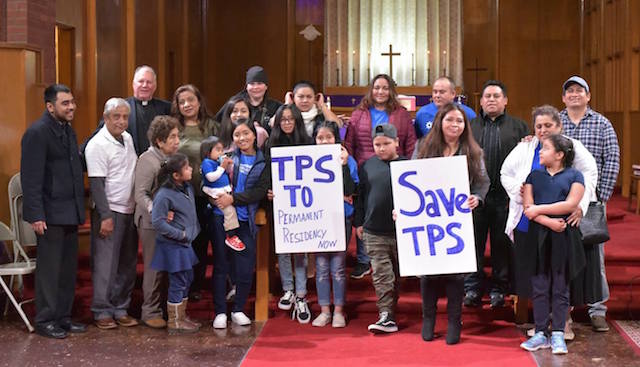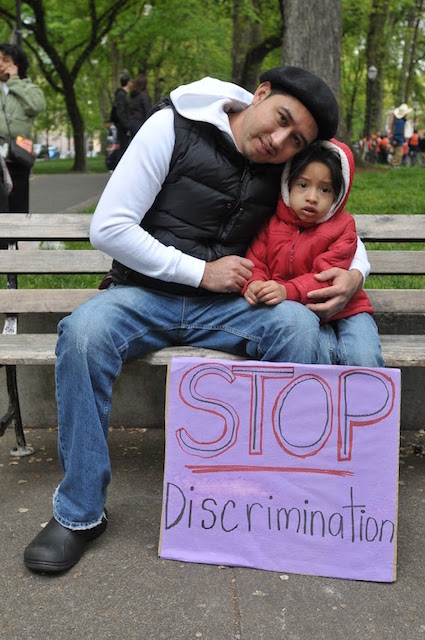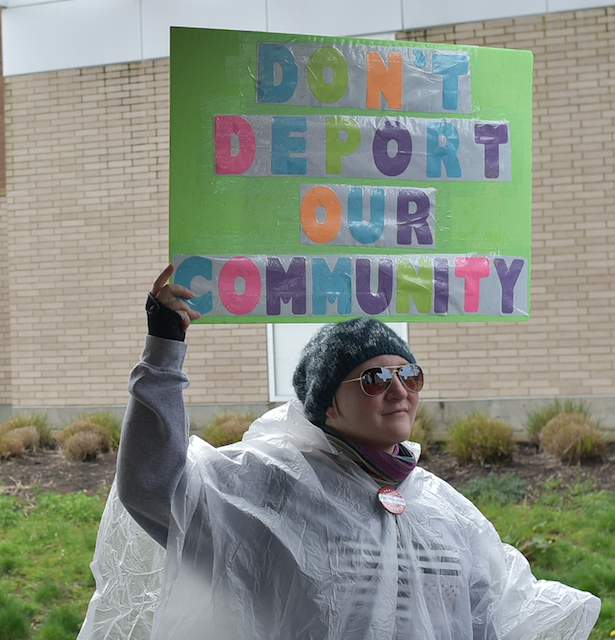
Story and photos by Pete Shaw
Patricia Hernandez is a dental technician, business owner, and mother. She and her husband have lived in the United States for over 20 years. She pays her taxes and proudly states that she has a good attitude, is a good neighbor, and is a good person.
But she is also afraid. Hernandez came to the US from El Salvador, and she holds temporary protected status (TPS), a designation created under the Immigration Act of 1990 for people who cannot safely return to their home countries because of extraordinarily dangerous circumstances including ongoing armed violence, environmental disasters, and economic collapse, along with other catastrophic conditions. Holders of TPS may not be deported from the US based on their immigration status, are eligible for an employment authorization document, and are legally allowed to return to the US after traveling abroad.
Since its inception, TPS had been renewed regardless of whether a Democrat or a Republican sat in the White House. It has largely flown under the radar of people and groups opposed to immigration, who set their racist sights and energies on people without documentation. Currently over 300,000 people from ten countries have TPS. For many TPS holders such as Patricia, temporary status has been extended long enough for them to begin families, establish businesses, and become elemental members of their communities.
Unsurprisingly, upon taking the presidency in 2017, the Republican Trump Administration began rolling back TPS protection, creating instability among holders, their families, and their communities. The first people who were designated to lose TPS were the approximately 250,000 from El Salvador, Haiti, Nicaragua, and Sudan, countries whose citizens are largely non-white, as is true for nationals of other countries–Honduras, Nepal, Somalia, South Sudan, Syria, and Yemen–who are eligible for TPS. The Trump Administration’s rationale for ending TPS for people from these countries has been that the initial conditions that led people to apply for it no longer exist.
However, on October 3, 2018, US District Judge Edward Chen granted a preliminary injunction that prevented the government from ending TPS for immigrants from those four countries while a March 2018 lawsuit challenging the Trump Administration’s position winds through the courts. In late February of this year, the Department of Homeland Security (DHS), which now oversees the TPS program, announced that immigrants from El Salvador, Haiti, Nicaragua, and Sudan would continue holding TPS status.

Following that first lawsuit, the DHS announced it would also terminate TPS for holders from Nepal and Honduras. On February 10, TPS holders from those countries also filed suit, claiming the Trump Administration’s decision was driven by racism.
Patricia Hernandez is just one of the many TPS holders who are organizing against the Trump Administration’s push to eliminate the program. On Tuesday April 2, at a press conference at Augustana Lutheran Church, she asked elected officials to recognize the contributions of the almost 1,000 TPS holders living in Oregon and to do all they can to resist the Trump Administration.
“We want our voices to be heard, the voices of our children who are US Citizens,” said TPS holder Silvia Martinez. “Our political leaders should be more aware of the damage that the cancellation of TPS would cause to our families. We would be deported to a country where we have not lived for more than 20 years, and our children would be forced to live in a country they do not know. We are hardworking people who contribute to the progress and development of this great country, and we want the opportunity to continue contributing in the same way as we have been doing it for more than 20 years.”
Hernandez, Martinez, and some more of those thousand Oregonian holders of TPS, have formed a Portland branch of the National TPS Alliance, one of approximately 50 across the country organizing to save TPS and to push for legislation that will create a path to permanent residency.
Both solutions are necessary. Like Hernandez, Martinez is from El Salvador. Salvadorans, who have been eligible for TPS since a series of earthquakes ravaged the country in 2001, make up the vast majority of TPS holders. The National Immigration Forum estimates that of the “over 300,000 foreign nationals” holding TPS, about 195,000 are people from El Salvador, although the Center for Public Integrity states there are 263,280 Salvadorans who are TPS holders.
Prior to the earthquakes, the people in El Salvador suffered through a long, brutal civil war that saw the US backing and funding the Salvadoran military, paramilitary death squads, and other apportioners of horrific violence to suppress a people’s movement that believed the resources of their country belonged to them, and who wanted a government that would reflect this. The desire for a government that would reflect the interests of a greater swathe of the Salvadoran people was met with great hostility by the wealthy and powerful, the military, and the United States, which considered Central America its property and dealt harshly with those who opposed that attitude.
El Salvador is still a dangerous place for many people. Many of the refugees massing at the Mexico-US border are attempting to flee it and the gang violence that has made their lives untenable. US foreign and economic policy has played a huge role in the current state of El Salvador.
Jacqueline, who is from El Salvador and attended the press conference, said, “People come here because they fear for their lives. People that live in El Salvador have to follow certain rules that gangs have, like you’re not allowed to wear red, you’re not allowed to wear blue, you’re not allowed to go into a different town if you don’t ask for permission. That’s how bad it is. If people want to go visit a different city, they have to call ahead of time and ask for permission. If they say it’s okay to go, it’s okay. But otherwise they can’t. If they do, they’re just risking their life.”
In the United States, TPS holders have become integral to their communities, both local and national. They are fellow workers and congregants. Their children play with the children of some of those fellow workers and congregants. They are neighbors, people down the block, and a family walking in the park. For many TPS holders, the US is at least as much their home as is their country of origin. For their children, it is often the only home they have ever known.

When asked what what would happen if she had to go back to El Salvador, Martinez replied, “Everything I have, I have here. Everything. I have nothing there. It’s very scary.”
Her daughter Leslie worries no less. Leslie is 13 years old. She is not shy, but she is oddly calm for someone her age. She enjoys her Spanish and physical education classes, and she also plays volleyball and sings in the school choir. On paper, her life seems like many other young people’s lives, and indeed when asked to describe her usual day, she replies, “My parents go to work. I go to school. We do everything that every other family would do.”
Of course, with the threat of her mother losing her TPS, Leslie’s life is not normal. “I worry often because my parents always help me through stuff, and they’re always there for me. And just the thought of them going away is one of the scariest thoughts I could have.”
11 year old Yeimy is in many ways akin to Leslie. She enjoys school, and she looks forward to playing in the school band when she enters middle school next year. Yeimy’s favorite subject is math because she finds it so easy. When speaking at the press conference of a possible future where her parents lose their TPS, she expressed herself as Leslie did, in a similar calm tone covering a deep anxiety. She stated, “If my parents were to get deported, then it would mean a lot because my parents are one of the most specialest things in the world for me. They help me with my education, and they work hard to keep a roof over our heads. And all the support and all the love that they give to us means a whole lot of the world to us, to me.”
Her love for her parents rang clear, but afterward, Yeimy wanted to make sure that when she had said “it would mean a lot” if her parents were deported, she did not intend to sound as if she wanted that to happen. “I really do care about my parents,” she clarified, “because it they ever got deported it would mean–it’s really harsh–they are my parents, and they did bring me into this world for me to have a more calmer life, a more peaceful life.”
Ten year old Oscar Hernandez has experienced the pain of losing a parent through deportation. Like Leslie, Yeimy, and many children of TPS holders, Oscar was born in the US and is thereby a US citizen. His father was torn away from him three years ago. His mother is the above-mentioned Jacqueline. Now, Oscar’s father lives in El Salvador, and Oscar understandably misses his dad. At his age, he seems too young to appreciate the notion of life mileposts. But he recognizes that many kids around him have had experiences that he never will. “I didn’t have the opportunity to grow up like other kids with their own dad,” he said. “My dad couldn’t be there when I rode my first bike. My stepdad takes me fishing. My dad never got to take me.”
“It’s kind of hard on kids,” said Jacqueline, who also has another child with Oscar’s father. “It’s definitely traumatizing, especially for little kids. When kids are grown a little more, they understand a little more what happens to their parents. For little kids it’s very hard. For me it was hard–a single mother raising two kids. It wasn’t easy.”
For those not swayed by moral arguments, there are economic ones. According to an April 2017 study by the Immigrant Legal Resource Center, “Terminating TPS for El Salvador, Honduras, and Haiti will have significant and far reaching economic impacts on our nation’s economy. Removing these individuals will cost taxpayers over $3 billion, and the inability of these individuals to work will result in over $45 billion in lost GDP over a decade and $6.9 billion in lost Social Security and Medicare contributions over a decade. Moreover, employers will incur close to $1 billion in turnover costs for the wholesale termination of this population.”

“In sum,” the study concludes, “the United States benefits immensely when immigrants can work. Given this strong economic argument, it is in the national interest for DHS to renew TPS for El Salvador, Honduras, and Haiti.”
Gaining the support of politicians, particularly but not entirely limited to Democrats, should be easy. But in these odd times, more than usual, nothing is ever easy. President Trump launched his presidential campaign by declaring all Mexicans rapists and drug dealers, and his grossly generalized racism toward seemingly all other non-white people has created a segment of the electorate ripe for the Democratic Party’s picking. Politics however, particularly in a system so conservative as that of the US, moves slowly. Thus the press conference urging Governor Kate Brown, along with Senators Jeff Merkley and Ron Wyden, to “speak up to keep families together.”
Donald Trump’s overt racist appeals have exposed the white supremacy upon which the US was founded and which always lies just below its surface, its adherents now confident enough to express their underlying hatred in public. “It’s getting worse,” said Jacqueline. “President Trump can be racist. Everyone feels they can, because if the president can be racist, they feel like that’s okay. A lot of people feel it’s okay to be racist against undocumented immigrants and even documented people from other countries.”
The National TPS Alliance PDX is just one of many groups in Oregon and across the country fighting for all TPS holders. Its members also recognize their place in the broader struggle for immigrant rights and immigrant justice. Francisco Aguirre, who for many years has both fought and endured persecution by the Immigration and Customs Enforcement Agency (ICE) and other arms of the US government, is a regional coordinator for the National TPS Alliance.
“The TPS campaign is part of the bigger picture of fighting for immigration reform,” Aguirre said. “The TPS holders have been in the shadow for many years. Nobody knows about them. Nobody talks about TPS. Why? Because the government just wants to give a temporary protection and then just get rid of the people. But after 20 years being in this country, for those people it means a lot. They own a lot. They contribute a lot. And they want to make noise and let people know that TPS holders are human beings, are people from many countries.”
Aguirre concluded, “It’s sad because the US is a beautiful country, and Oregon is a beautiful state. A great state where we should stand up together with the TPS people and understand that they are part of the same struggle, that they are part of daily life like any Oregonian.”
Want to get involved? Please go to the National TPS Alliance PDX Facebook page at: https://www.facebook.com/nationaltpspdx/






